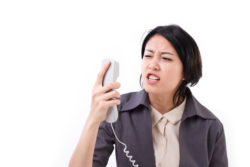
Debt collectors are agencies who purchase the debt or who handle the debt collection efforts on behalf of a company. If another person has an overdue balance with a company and that business has not been able to recover the debt, a collection agency can be used to manage the outreach.
That situation can become very frustrating, however, if you’re the one getting phone calls on a debt that doesn’t belong to you. But there are ways to fight back against these kinds of calls—they may have been placed in violation of consumer protection laws, and you may be entitled to some kind of compensation as a result.
How Did the Debt Collectors Agency Get My Phone Number?
Your first instinct is to delete the voicemail or to tell the debt collectors agency never to call you again. But these initial concerns also raise the question: how did they get your phone number in the first place? This might not be the last time you hear from this collector or any other collection agency. Plus, these wrong number calls may be robocalls, placed using an autodialer or using an automated voice recording, which can make it much more difficult to speak to a live person and stop them from contacting you further.
If the debt does belong to you, there are a variety of ways these agencies collect information. This includes from the original creditor, from a friend or family member, the internet, caller ID, or your credit report. It’s also possible that your phone number was previously used by the person who did rack up that debt and that the collection agency is reaching out to you because they don’t know it’s your phone number now.
What if the Debt Collectors Agency Won’t Stop Harassing Me?
If you’ve already told the debt collectors agency that they’ve got a wrong number, the employee on the other end of the line might assume you’ve made that up in order to avoid responsibility for the debt. That does not give the collection agency an open license to keep contacting you, however. A wrong number call goes from annoying to invasive when it keeps happening.
The first time the wrong number call happens, make sure that you keep records.
Ask who’s calling. Determine that they are not trying to reach you and that they are indeed looking for someone else. Ask that they not communicate with you again.
One of the best things you can do in response to a wrong number call from these agencies is to create a paper trail showing that you’ve asked them to stop. Do this by getting details about who they are and how to reach them and then organize this in a cease and desist letter. Federal law requires that a debt collector discontinues their communication to you if you have asked for it to stop in writing.
Additionally, the collection agency may be in violation of provisions of the Telephone Consumer Protection Act, especially if they have used robocalls or autodialers to place these calls.
What is the TCPA?
Due to an increasing amount of technology-based solicitation affecting people across the U.S., the Telephone Consumer Protection Act was introduced back in 1991 to protect consumers. In the nearly 30 years since the TCPA was first enacted, technology has changed, and along with it the many ways that telemarketers and scammers use to contact consumers. But so too has the TCPA shifted to encompass new technologies as they emerge.
The TCPA regulates a number of communications, including telemarketing calls, auto-dialed calls, prerecorded calls, text messages, and unsolicited faxes. The TCPA is also the authority under which the National Do-Not-Call registry was created, which allows consumers to place their names on the list to let telemarketers know not to call them.
 While the Do-Not-Call registry may not stop all robocalls—some companies or scammers may be willing to sidestep the law—reporting violations of the registry alerts the Federal Trade Commission (FTC) about trends in TCPA violations and help them take the most effective action through both litigation and technology.
While the Do-Not-Call registry may not stop all robocalls—some companies or scammers may be willing to sidestep the law—reporting violations of the registry alerts the Federal Trade Commission (FTC) about trends in TCPA violations and help them take the most effective action through both litigation and technology.
Indeed, the FTC has reported a significant “crackdown” on illegal robocalls in the last year, taking action against dozens of major illegal robocallers. However, tens of billions of illegal robocalls are placed every year, noted Andrew Smith, the FTC’s Consumer Protection Bureau director, making this action still just a “drop in the bucket,” according to USA Today.
TCPA Violations
The New York Times reports that more than 48 billion robocalls were placed in 2018 in the U.S., a huge increase from 2017. Now, a growing number of people all across the United States are turning to litigation over issues with spam texting, autodialers, and robocalls.
From that point of filing, the debt collector can only reach out to you one more time with details about their intended next steps. Once you’ve created this documentation and kept records about their continued outreach to you, this should be shared with your attorney.
While you could file an FTC complaint, that doesn’t give you much leverage personally to stop the behavior. Extreme cases might require intervention from an experienced lawyer who can not only get the company to stop calling you but to file legal action to hold them accountable for their disruptive and inaccurate behavior.
Can I File a Debt Collection TCPA Lawsuit?
A growing number of people are coming forward to file debt collection TCPA lawsuits. Consumers who have been subjected to violations of the TCPA may be able to recover damages of between $500 and $1,500 for each violation.
If you have been affected by autodialer calls or spam texts from a debt collection company, or any company that you did not give your prior consent to receive, even if those messages appear to be intended for someone else and it was sent to the wrong number, you may be able to file a TCPA complaint and pursue compensation.
Filing a lawsuit can be a daunting prospect, so Top Class Actions has laid the groundwork for you by connecting you with an experienced attorney. Consulting an attorney can help you determine if you have a claim, navigate the complexities of litigation, and maximize your potential compensation.
Join a Free TCPA Class Action Lawsuit Investigation
If you were contacted on your cell phone by a company via an unsolicited text message (text spam) or prerecorded voice message (robocall), you may be eligible for compensation under the Telephone Consumer Protection Act.
This article is not legal advice. It is presented
for informational purposes only.
ATTORNEY ADVERTISING
Top Class Actions is a Proud Member of the American Bar Association
LEGAL INFORMATION IS NOT LEGAL ADVICE
Top Class Actions Legal Statement
©2008 – 2026 Top Class Actions® LLC
Various Trademarks held by their respective owners
This website is not intended for viewing or usage by European Union citizens.















11 thoughts onGot a Wrong Number Call from a Debt Collectors Agency?
add me